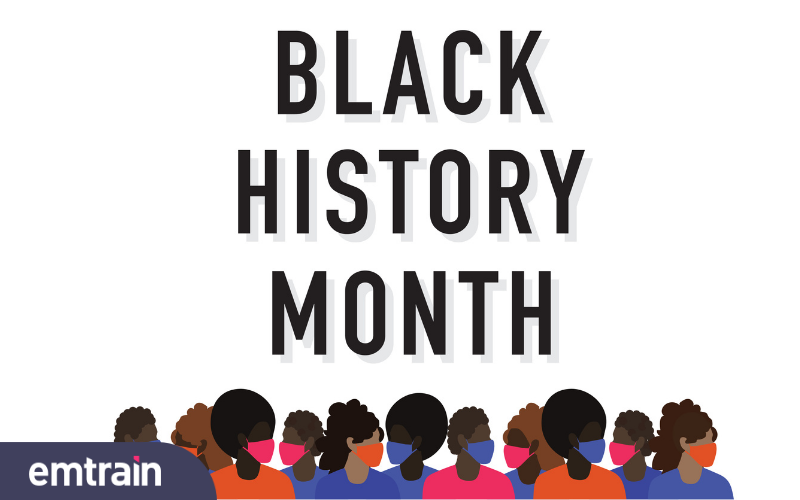This year’s Black History Month theme is Black Resistance. Throughout African American history, Black people have had to fight for their lives and push back against the belief that they are inferior, dealing with the discrimination and unjust acts that come along with this.
We celebrate and recognize the bravery and the fight that the Black community continues to have in efforts to make the United States “live up to its ideals of freedom, liberty, and justice for all.” They have continued to experience discrimination and oppression in every aspect of society, “from employment to education to housing.” Over time, Black people have made great progress and have made significant triumphs towards equality by solely resisting and continuing to fight for their rights.
Black History is American history. Unfortunately, the American education system does not teach students African American history, the contributions that Black Americans have made to American achievement and progress, and the structural inequities which still plague every major societal institution.
Brands have professed solidarity, established Juneteenth as a company holiday, raised and donated money to Black non-profit organizations, pledged to create a more diverse, inclusive workforce, and shared several books and films on the Black experience, becoming an ally, and more. It’s time for HR and Culture Leaders to build on that momentum by sharing stories of celebration as well as sobering truths of what the Black community continues to face today.
Support and Partner with Black-owned Businesses
Why is it so important to support and partner with Black-owned businesses and entrepreneurs? Historically, they’re the most underfunded group due to biased practices made by investors and financial services. Investors’ discriminatory financing practices and bias toward companies primarily operated by White males cost the U.S. over 9 million jobs and $300 billion in collective national income (the Center for Global Policy Solutions). Additionally, Black women received just 0.27% in venture capital investment between 2018 and 2019, for a total of $3.1 billion. Fewer than 100 Black women business owners report receiving investments of at least $1 million.
Organizations have immense opportunities to support Black-owned businesses. For example, if your company sends all your remote employees lunch once or twice a month, give them options to order from Black-owned restaurants. You can send them other treats from Black-owned businesses as well. Additionally, your organization has the opportunity to partner with other Black-owned organizations, whether it’s partnering on a joint event, marketing and branding, technology applications, and much more. For example, if your marketing team is looking to hire a PR firm, consider filtering down your search to Black-owned firms. If you’re a retailer, consider bringing in and showcasing Black designers to your retail business.
Share Little Known Facts & Figures
The Internet, especially social media, has many unique facts about Black History that we are unaware of or not taught under the American education system. For example, did you know that Claudette Colvin was one of the first Black people who refused to move to the back of the bus nine months before Rosa Parks’ stand that launched the Montgomery bus boycott?
Websites like History.com and PBS.org have several different facts that you can share with your workforce. Search social media hashtags like #blackhistorymonth to find other facts that people are sharing. Consider adding these facts and figures to your internal company newsletter or share them in your company-wide channel every morning to start the day. Your employees will appreciate the time and effort you put into your research and sharing these little-known facts with them.
Set the Tone to Be An Ally in Your Everyday Life
Don’t limit your company to celebrating for 28 days. Regardless of how short this month is, your organization can still commit to celebrating Black History Month for 31 days and set the tone for how things should be year-round. Black History is part of American history and will continue to impact how we communicate and behave with each other in the workplace.
Nancy Douyon, Emtrain’s Ethics and Culture Expert, shared some tips in a blog post on becoming an ally:
Invest a bit of time and energy in learning about and understanding the black experience. Yes, you can talk to Black people as part of your discovery, but do some due diligence first and spend a few hours getting informed. Get informed on these topics:
Criminal justice system — why do black men populate our prisons?
- Police brutality — why do parents have “the talk” with their kids?
- Healthcare – why are black people having significantly higher percentages of bad health outcomes?
Elizabeth Morrison, Chief Diversity, Inclusion & Belonging Officer at Levi Strauss & Co., prepared a great list of resources to help you. Select at least a few and start learning. Here are three favorites:
- Watch: Color Brave or Color Blind (TedTalk)
- Watch: The Cost of Code Switching
- Watch: 13th (A documentary on racial inequality in criminal justice)
Read more in her blog post: A Conversation About Black Lives Matter and Being an Ally.
While these are just a few ways to help your organization celebrate Black History Month, consider these tips as a way to set the tone to incorporate diversity, equity, and inclusion into your culture and business practices.










